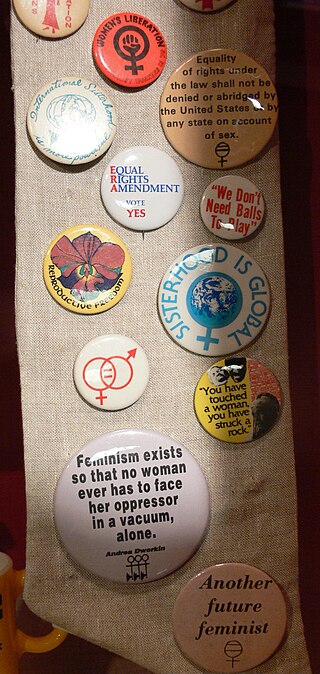Feminist film theory is a theoretical film criticism derived from feminist politics and feminist theory influenced by second-wave feminism and brought about around the 1970s in the United States. With the advancements in film throughout the years feminist film theory has developed and changed to analyse the current ways of film and also go back to analyse films past. Feminists have many approaches to cinema analysis, regarding the film elements analyzed and their theoretical underpinnings.
Film theory is a set of scholarly approaches within the academic discipline of film or cinema studies that began in the 1920s by questioning the formal essential attributes of motion pictures; and that now provides conceptual frameworks for understanding film's relationship to reality, the other arts, individual viewers, and society at large. Film theory is not to be confused with general film criticism, or film history, though these three disciplines interrelate.
Feminism is a range of socio-political movements and ideologies that aim to define and establish the political, economic, personal, and social equality of the sexes. Feminism holds the position that societies prioritize the male point of view and that women are treated unjustly in these societies. Efforts to change this include fighting against gender stereotypes and improving educational, professional, and interpersonal opportunities and outcomes for women.
Feminist literary criticism is literary criticism informed by feminist theory, or more broadly, by the politics of feminism. It uses the principles and ideology of feminism to critique the language of literature. This school of thought seeks to analyze and describe the ways in which literature portrays the narrative of male domination by exploring the economic, social, political, and psychological forces embedded within literature. This way of thinking and criticizing works can be said to have changed the way literary texts are viewed and studied, as well as changing and expanding the canon of what is commonly taught. It is used a lot in Greek myths.
Gender studies is an interdisciplinary academic field devoted to analysing gender identity and gendered representation. Gender studies originated in the field of women's studies, concerning women, feminism, gender, and politics. The field now overlaps with queer studies and men's studies. Its rise to prominence, especially in Western universities after 1990, coincided with the rise of deconstruction.
Psychoanalytic film theory is a school of academic thought that evokes the concepts of psychoanalysts Sigmund Freud and Jacques Lacan. The theory is closely tied to Critical theory, Marxist film theory, and Apparatus theory. The theory is separated into two waves. The first wave occurred in the 1960s and 70s. The second wave became popular in the 1980s and 90s.
Écriture féminine, or "women's writing", is a term coined by French feminist and literary theorist Hélène Cixous in her 1975 essay "The Laugh of the Medusa". Cixous aimed to establish a genre of literary writing that deviates from traditional masculine styles of writing, one which examines the relationship between the cultural and psychological inscription of the female body and female difference in language and text. This strand of feminist literary theory originated in France in the early 1970s through the works of Cixous and other theorists including Luce Irigaray, Chantal Chawaf, Catherine Clément and Julia Kristeva, and has subsequently been expanded upon by writers such as psychoanalytic theorist Bracha Ettinger. who emerged in this field in the early 1990s,
Feminist theory is the extension of feminism into theoretical, fictional, or philosophical discourse. It aims to understand the nature of gender inequality. It examines women's and men's social roles, experiences, interests, chores, and feminist politics in a variety of fields, such as anthropology and sociology, communication, media studies, psychoanalysis, political theory, home economics, literature, education, and philosophy.
Feminist philosophy is an approach to philosophy from a feminist perspective and also the employment of philosophical methods to feminist topics and questions. Feminist philosophy involves both reinterpreting philosophical texts and methods in order to supplement the feminist movement and attempts to criticise or re-evaluate the ideas of traditional philosophy from within a feminist framework.
Feminism is a broad term given to works of those scholars who have sought to bring gender concerns into the academic study of international politics and who have used feminist theory and sometimes queer theory to better understand global politics and international relations as a whole.

Bracha Lichtenberg Ettinger is an Israeli-British artist, writer, psychoanalyst and philosopher, born in Mandatory Palestine and living and working in Paris. She is a feminist theorist and artist in contemporary New European Painting who invented the concept of the Matrixial Gaze and related concepts around trauma, aesthetics and ethics. Ettinger is a professor at European Graduate School in Saas-Fee, Switzerland and at GCAS, Dublin. In 2023, she was part of the Finding Committee for the Artistic Director of Documenta's 2027 edition. She resigned from that role with a public letter intended to open a radical discussion in the artworld, following the administration's rejection of her request for a pause due to the Israeli invasion of the Gaza Strip.

Griselda Frances Sinclair Pollock is an art historian and cultural analyst of international, postcolonial feminist studies in visual arts and visual culture. Since 1977, Pollock has been an influential scholar of modern art, avant-garde art, postmodern art, and contemporary art. She is a major influence in feminist theory, feminist art history, and gender studies. She is renowned for her innovative feminist approaches to art history which aim to deconstruct the lack of appreciation and importance of women in art as other than objects for the male gaze.

A variety of movements of feminist ideology have developed over the years. They vary in goals, strategies, and affiliations. They often overlap, and some feminists identify themselves with several branches of feminist thought.
Poststructural feminism is a branch of feminism that engages with insights from post-structuralist thought. Poststructural feminism emphasizes "the contingent and discursive nature of all identities", and in particular the social construction of gendered subjectivities.
The Matrixial Gaze is a 1995 book by artist, psychoanalyst, clinical psychologist, writer and painter Bracha L. Ettinger. It is a work of feminist film theory that examines the gaze as described by Jacques Lacan, criticises it, and offers an original theory concerning feminine and female gaze. Beginning in 1985, Ettinger's artistic practice and her theoretical invention of a matrixial space articulated around her proposal of a feminine-maternal sphere of encounter that begins in the most archaic (pre-maternal-prenatal) humanised encounter-event, led her to publish a long series of academic articles starting 1992, articulating and developing for some decades what she has called the matrixial theory of trans-subjectivity. The matrixial theory formulates Aesthetics and artistic creativity in terms of withnessing, compassion, wondering and 'fascinance', as well as Ethics of witnessing, responsibility, respect, compassion and care, and the passage from co-response-ability to responsibility and from com-passion to compassion. Bracha L. Ettinger invented a field of concepts that have influenced debates in contemporary art, psychoanalysis, women's studies, film studies, feminism, gender studies and cultural studies.

Virginia Potter Held is an American moral, social/political and feminist philosopher whose work on the ethics of care sparked significant research into the ethical dimensions of providing care for others and critiques of the traditional roles of women in society.
Feminist justice ethics is a feminist view on morality which seeks to engage with, and ultimately transform, traditional universal approaches to ethics. Like most types of feminist ethics, feminist justice ethics looks at how gender is left out of mainstream ethical considerations. Mainstream ethics are argued to be male-oriented. However, feminist justice ethics does differ considerably from other feminist ethics. A universal set of ethics is a significant part of feminist justice ethics. Feminist justice ethics is clear in dividing "thick" morality from "thin" morality. Other ethical approaches that define themselves by differentiating groups from one another through culture or other phenomena are regarded as "thick" accounts of morality. Feminist justice ethics claims that "thick" accounts of morality, as opposed to "thin" accounts of morality, are intrinsically prone to eroding valid feminist critique.
Feminist art criticism emerged in the 1970s from the wider feminist movement as the critical examination of both visual representations of women in art and art produced by women. It continues to be a major field of art criticism.
Archaic mother is the mother of earliest infancy, whose continuing influence is traced in psychoanalysis, and whose (repressed) presence is considered to underlie the horror film.
The female gaze is a feminist theory term referring to the gaze of the female spectator, character or director of an artistic work, but more than the gender it is an issue of representing women as subjects having agency. As such all genders can create films with a female gaze. It is a response to feminist film theorist Laura Mulvey's term "the male gaze", which represents not only the gaze of a heterosexual male viewer but also the gaze of the male character and the male creator of the film. In that sense it is close, though different, from the Matrixial gaze coined in 1985 by Bracha L. Ettinger. In contemporary usage, the female gaze has been used to refer to the perspective a female filmmaker (screenwriter/director/producer) brings to a film that might be different from a male view of the subject.





